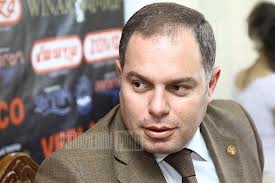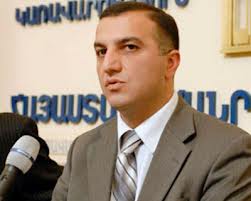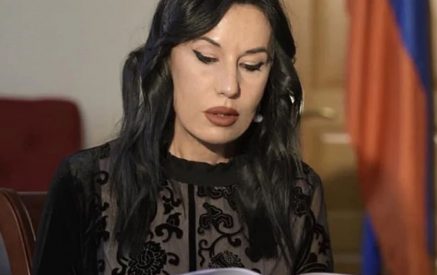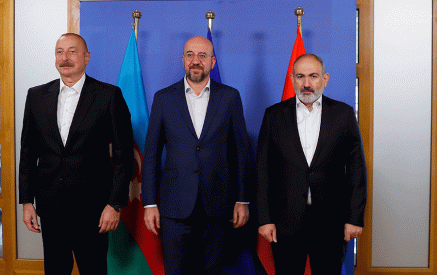Galust Sahakyan, a deputy leader of the Republican Party of Armenia (RPA) and the leader of the RPA parliamentary group, gave a staggering answer during a conversation with www.aravot.am today to our question why they didn’t adapt the National Assembly building for the people with disabilities. The matter is that the RPA promised as early as before the previous parliamentary election that they would eliminate reasons for inequality in our country, make education and work accessible for vulnerable groups of the society, ensure accessibility for disabled people etc. However, a few days ago, we noticed in the National Assembly how hard it was for Arman Musheghyan, the head of the World Without Obstacles NGO, to climb the stairs of the National Assembly in a wheelchair, because elevators were narrow and the wheelchair couldn’t get into it. In response to our question what they did for disabled people and why they didn’t fulfill their pre-election promises, Galust Sahakyan said, “No one can deny that very serious work has been done in that field.” We asked him to give examples what exactly had been done, “I can give many examples, but it is natural that there are still things to do. It is a constant activity.”
In response to our observation that disabled people in our country didn’t see particular changes, the country didn’t become accessible, for example, buses with Wi Fi were brought, but they were not adapted for people with disabilities, Galust Sahakyan said, “A few years ago, disabled people couldn’t even leave their homes. Now it is rather interesting. Firstly, the problem with their wheelchairs has been solved. First of all, they can appear on the international arena to a certain extent. That is why I say that much work has been done. With regard to the National Assembly that you say, there is no problem of adaptation, because one can easily enter in a wheelchair and get into the elevator.” When we informed Mr. Sahakyan that elevators of the National Assembly were narrow, a wheelchair couldn’t get into them, he responded, “So you propose that we change the elevators? I don’t remember any disabled person to come to the National Assembly during all these years – only one or two disabled people have come. They also come during hearings. You can talk much about why there aren’t any in shops and hospitals.” In response to our question whether it wasn’t worth to spend money even on one or two people, even on Arman Musheghyan, since no one was ensured against disability nowadays, certainly, God forbid, but he and other MPs could have a disability, Mr. Sahakyan said that there were non-disabled people too, they had to meet the requirements of the non-disabled too, “The problem is the following – we know and feel it quite well. It is an issue of means and the means are not enough, neither can we solve it quickly.” We hinted that it didn’t require much money, one could at least install wheelchair ramps, Galust Sahakyan replied, “We have to change the elevator, where should we install the wheelchair ramp? How can one install a wheelchair along that kind of a staircase? One won’t be able to climb it.”

Read also
The Prosperous Armenia Party made concrete promises before the previous parliamentary election that they would deal with the problems of disabled people with professional education, training and employment. However, when we inquired in a few companies that belong to Gagik Tsarukyan, the leader of the PAP – Multi Rest House, Multi City House, which is a part of Multi Concern – there were no people with disabilities working there at all. In response to our question what the PAP did now to implement the pre-election promise, Naira Zohrabyan said, “We have put forward projects. Besides, thanks to the efforts of the Gagik Tsarukyan Foundation wheelchair ramps have been installed in public spaces. Those have already been done.”
As for adapting the National Assembly building, Ms. Zohrabyan said, “I don’t think that they will give permission to the Gagik Tsarukyan Foundation to install wheelchair ramps in the National Assembly building. If they give, we will install them with great pleasure. We are ready to continue our program. However, you know what, one cannot solve the problem of people with disabilities by that. The most serious problem still is their integration into the society. Our parliamentary group economic team is working on at least 2-3 legislative proposals now, in order to make tax deductions for organizations that employ exclusively disabled people. Our parliamentary group is working on at least 2-3 projects and we will put them forward in the short run. As for another very important problem, installing wheelchair ramps, in order that disabled people leave their homes and are not alienated from the society, the foundation has solved that problem in many places.”
In response to our observation that Gagik Tsarukyan had a set of private companies, why he didn’t employ at least a few people with disabilities there, Naira Zohrabyan said, “Frankly speaking, I am not engaged in the foundation activities. I cannot answer whether disabled people work or not. However, if there are people who belong to this or that class of disability, but they are able to work, I don’t think that there will be any negative attitude toward them in Tsarukyan’s company, in any enterprise belonging to Multi Group. It is ruled out.”
Hovhannes Sahakyan, an RPA MP

Margarit Yesayan, a Member of the RPA Parliamentary Group

Armen Asatryan, the Minister of Labor and Social Affairs

Hripsime JEBEJYAN
P.S. – www.aravot.am was informed that today Hovik Abrahamyan, the Speaker of the National Assembly, had instructed the staff to solve the problem, in order that people with disabilities were able to easily move in the National Assembly from now on.



























































